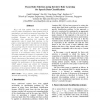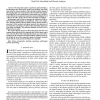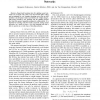1400 search results - page 9 / 280 » Post-Analysis of Learned Rules |
120
Voted
CIKM
2010
Springer
15 years 13 days ago
2010
Springer
The major challenge in mining data streams is the issue of concept drift, the tendency of the underlying data generation process to change over time. In this paper, we propose a g...
123
click to vote
PKDD
2010
Springer
15 years 7 days ago
2010
Springer
Current knowledge bases suffer from either low coverage or low accuracy. The underlying hypothesis of this work is that user feedback can greatly improve the quality of automatica...
120
Voted
ICPR
2008
IEEE
16 years 3 months ago
2008
IEEE
Fuzzy rule base systems have been successfully used for pattern classification. These systems focus on generating a rule-base from numerical input data. The resulting rule-base ca...
TSMC
2002
15 years 1 months ago
2002
By using other agents' experiences and knowledge, a learning agent may learn faster, make fewer mistakes, and create some rules for unseen situations. These benefits would be ...
110
click to vote
IJCNN
2006
IEEE
15 years 7 months ago
2006
IEEE
Abstract— Supervised learning rules for spiking neural networks are currently only able to use time-to-first-spike coding and are plagued by very irregular learning curves due t...



